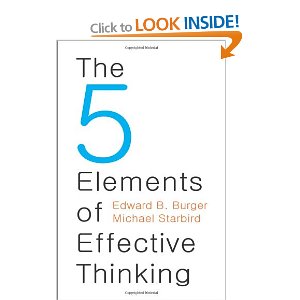I figure late is better than never and since I was late, I'll make it a slower but more effective review I think. :) I'll going through the five elements one at a time.
Earth - Understand deeply
Fire - Make mistakes
Air - raise questions
Water - follow the flow of ideas
The Quintessential Element - by mastering the above skills you will change.
So this first post we will focus on Earth, the skill of understanding deeply.
Part of understanding deeply is the master the basics. To know your basic information so well that it flows effortlessly and with exquisite beauty. Understand the basics of your field of study so well that to recall them is effortless.
To do this you need to ask yourself
1. What do you know about the subject? Do this without referring to any external sources. "Can you write a coherent, accurate and comprehensive description of the foundations of the subject or does your knowledge have gaps? ....Do you fail to see the overall big picture that puts the pieces together?'
2. Once you have that done and can see where the gaps in your education are... then go to external sources and fill those gaps in.
3. Wherever you see gaps in your knowledge of the basics of whatever you are learning, fill them in. Be methodical about it.
4. Once you have filled in the gaps make sure you can connect them to the larger whole. Make you knowledge complete.
5. when faced with a difficult problem that you can't solve, find another problem that you CAN solve. Work your way up to solving the difficult problem. You can do this by discovering what the core of the problem is. Isolate it. Then work on that. When you do that you help yourself learn to ignore distractions and the non-essentials are you are getting to the heart of the matter.
6. Say what you see, and if you don't see something don't say that you do. Be honest about what you are looking for and don't let biases or expectations or others influence that. Just say what you see.
7. if you are saying something, make sure it's true. Don't base your facts on what ONE person says. Do your research and be sure of your facts.
8. Sometimes by following an opinion divergent to your home helps you make better, more informed opinions. Just look at your facts from a differing point of view to make yourself more well-rounded.
9. Look for what perhaps you can't see, make the invisible visible.
Have to admit, when I read through this chapter I thought of all sorts of ways to help my son and myself learn better. Consider what I know. Write that down. Then figure out what I don't know. What information do we lack in our understanding of most anything? If we start with what we know then we have our grounding and there's no need to repeat it. I will need to reread this chapter and consider more how i can be an more effective thinker, and then teach my son those same skills. It will serve him well in his future education.








 RSS Feed
RSS Feed



